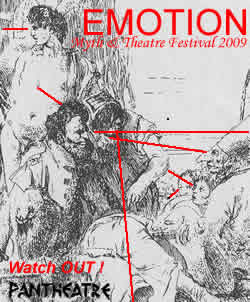Pantheatre’s Myth and Theatre Festival opens a new series under the banner of “Philosophy”. We dedicated the last four festivals to Myths of the Voice - from the founding myths of the Roy Hart Theatre to the voices of Sirens, Sibyls and, last year, of Scheherazade. Whether sweet and pure or broken and diabolical, these voices ‘speak’ the myths. Italian philosopher Giorgio Agamben put it this way: “listening to the voice in speech is what thinking is all about.” We pursue our journey with these echoes in mind, not unlike Ulysses, but with a new agenda: after more than twenty years of wanderings it is “time to commit and transmit” the work and philosophy of Pantheatre.
We start with EMOTION, and two radically contrasting points of view. In 2001 the prestigious Collège de France invited Oxford Computational Neuroscience Professor Edmund T. Rollsto present the latest in scientific research on brain and emotion. Answering questions after the talk,he defied anyone to give an “operational” definition of emotions other than as a reactive mechanism to punishment and reward. When the complexities and meanings of emotions are possibly one’s central artistic and philosophical concern, it is quite astounding to hear such a reductive, binary and provocative definition. Professor Rolls has since published “Explaining Emotion” (2005) – il faut le faire !
Here is a counterpoint to his neo-Darwinism (and 2009 marks the bicentenary of Darwin’s birth): what we call emotions today, mythology describes in terms of angels. An angel - from the Greek angelos - is a messenger, an emotional epiphany. When an angel passes, strikes or smiles, questions raise, not only of impact and neurobiological affect, but of content and of origin: who sends the message? If you chose polytheistic mythologies and angelologies as references, an emotional event is a plural cluster involving a constellation of Goddesses and Gods; it is therefore polyphonic and polysemic – including contradictory messages and musical counterpoints. Max Beauvoir, Haitian houngan, speaks of 403 loas (vodou divinities)! Artistically, for me, there is no question: the more complex the aperception, the richer the intelligence of emotion.
Early in his life, psychologist C.J. Jung proposed a theory of complexes as a classification of human behaviour in terms of intensity zones. A complex is something like an emotionally charged knot: touch a complex and you get an emotional shock. This was the basis for his later theory of archetypes, which James Hillman took up as his main reference in “archetypal psychology” - James Hillman being the main inspiring figure of our Festival. Scientists and aspiring scientists (with all respect to Doctor Jung) protect their methodologies with concepts such as emotion, libido, energy, complex, archetype. As artists, I see our job as one of “figuring out” these abstractions, of drawing them into fictions,
|
|
personalizing and contextualizing them – giving them, or even calling them names. Mythology is THE cultural game: let’s play it! In this perspective, religions should be fun: they are a great, if not the greatest of imaginative inventions - amazing figurations and explanations, rituals and behaviour diktats, inacceptable only if taken litterally.
In the field of emotion and consciousness studies, Antonio Damasio stands out as probably the most mercurial and influential scientist today – especially for artistic circles. Here is a ‘simple’ quote worth pondering: “the body is the theatre of emotions”. What if we changed the order to: “theatre is the body of emotions”. Such an inherently baroque formulation inverses subjective ideologies, those self-centred world-views that speak of “my” emotions within the boundaries of “my” body, as if we possessed emotions rather than emotions possessing us. For the performing arts the implications are critical. The definitions of emotion we work by determine our aesthetics; in my view they even determine the “feeling” of emotions - the values and intensities of the emotions that we feel.
And then there is… music – an elusive mistress to philosophical exactions. One classic definition says: “music is the language of emotions”, and neuroscientists are now, especially in the last fifteen years, seriously studying, and ‘upgrading’ the importance of music. Professor Steven Mithen in his recent book “The Singing Neanderthals” speculates on the coexistence (and war) between speech and song. His hypothesis is that the Neanderthals were expressive singing creatures and did not survive the arrival of the better-organized ‘imperialist’ speaking cousins: us, homo sapiens. Contemporary opera and musical theatre invite us to different forms of marriage between music and language (and movement). My own way of grappling with “the angel of emotion” calls mainly on the poetics of counterpoint, disassociation, face to face confrontation, conversions and correspondences, without eschewing the occasional nasty divorce, or the pleasures of a sweet honeymoon.
Furthermore, I often write on the laboratory blackboard: “music is the enemy”. This is a warning. In image-based performances, music wields the strongest influence, the strongest magic, precisely because of its alliance with the powers of emotion. Music catches us off-guard given the priority we give to the spoken discourse, or to the need for self-expression, i.e. to feeling “my emotions”. Music can ‘zombie’ us in no time, which is why it has ‘divine’ status in our laboratories. We should not to be lulled, dulled or deluded into thinking that the Gods and Goddesses turn up to be our emotional supporting orchestra. It just might happen now and then, but watch out, and keep trying to figure out who and what that angel represents.
We have lots to ponder, review, discuss and experiment. I hope you join us.
Enrique Pardo
|
